- Home
- Wayne Thomas Batson
GHOST_4_Kindle_V2 Page 2
GHOST_4_Kindle_V2 Read online
Page 2
I smiled politely, thanked the man, but kept walking. He was right. The sun was bright off the sand. But I’d seen brighter.
A few hundred yards later, I walked close to the water. Time was when I wouldn’t have gone within a thousand yards of this much water. I guess you could say I have a pathological fear of drowning. Maybe not for the reason you might think, but it’s real.
I’ve gotten over it, mostly. I even let the thin surf trickle over my feet. The water was warm like bath water, almost relaxing. And water was the key to a complete resetting. So maybe the best way to describe water and me is a love-hate relationship.
In the hazy hot distance, a fishing pier stretched out into the Gulf. But my objective was a mile closer. Massive, irregularly shaped stones had been piled up like a great cairn on the shore. Rocks stretched maybe a hundred yards out into the water, a massive skeletal finger pointing out to sea.
I didn’t know what I’d find there, at the end of those rocks…only that I would find something or someone.
The footing wasn’t as treacherous as I’d first thought it would be because a trail of sand and soil had been packed into the center of the stones all the way out. I stood at the opening to the path. The tide was coming in. Seaweed, driftwood, a red and white bobber, and a clear plastic bottle sloshed around near the shoreline. Orange fiddler crabs popped in and out of holes in the sand. I took a deep breath and started walking.
I was maybe twenty yards up the trail when a young man I hadn’t noticed earlier stood up from the end of the rocks and walked toward me. No, not a young man. A woman. Long dark hair tied back nearly out of sight, slight build and willowy, but definitely a woman. Late thirties, early forties, she moved slowly, her movements very natural and kind of dreamy. As she drew close, I saw her eyes better. Gray-green like the Gulf under storm clouds. They were sad, but there were no tears. She passed me without a word, but a few seconds later she called to me.
“Fair skin like that, you’ll burn you stay out here too long.”
I turned and smiled. “Thanks, but I’ll be okay.”
“No, really,” she said, glancing at my suitcase, “it’s different down here. You ought to put on some protection.”
“Again, thanks. But I won’t need it.”
She shrugged. “Suit yourself.” She turned. I turned. We both walked away, but I heard her mutter under her breath, “You’re gonna burn.”
The woman didn’t understand. In my family, only about a third of us burn, and I’m not one of them.
No, the heat of the sun wouldn’t hurt me. Not to say it wouldn’t affect me at all, however. I stood on the end of the rocky finger, sweat trickling down my temples, down the crease in my back. Even with the luau shirt over it, the black tank top was maybe not my best choice.
Out in the gulf, I saw a couple of dorsal fins appear and disappear. I watched them for a while…the way they surfaced, an arch of darkness following a perfect curve before submerging. It was like the fins were on some kind of wheel under the water. Dolphins are amazing creatures. Controlled, powerful, swift—much smarter than most marine life and, if threatened, even able to take on a shark. We were kindred in that way. Taking on sharks, that is. As I said, I’m not such a fan of swimming.
Beyond the dolphins, a few colorful triangles meandered lazily. Sailors are an enthusiastic lot, out playing even this early. A Sun Odyssey 42DS was heading south. It bore a sail splashed in purple, blue, and teal. On the hull, near the transom was a code of numbers and letters: FL 6606 KR. Some kind of marine registration number, that much was obvious, but I didn’t know much more than that. Still, I notice numbers…and I remember them.
Behind the first ship and closing rapidly was a longer Hunter 50 with light blue sails, each emblazoned with a cream colored conch shell. Just before it caught the Sun Odyssey, the Hunter turned and went out to sea. I noticed its code too: FL 6589 BD.
A third yacht was much farther out. I thought it might be an Oyster. Maybe a 625, but I couldn’t be certain. And I couldn’t read its registration number. I stopped and blinked at the sun-dappled Gulf and laughed to myself. “Well, I guess I know yachts pretty well,” I muttered. I’d had missions in coastal regions before, of course, but I couldn’t remember why I would have become so experienced with marine vessels. Another Memory Wash casualty.
“What’s this going to be about?” I whispered. Nothing came to mind. Whatever I was waiting for, it hadn’t shown up yet.
I stood there for a long time, a little too close to a lot of water for my comfort. But I’d learned a long time ago that sometimes, the most intelligent thing a person can do is wait. Rash decisions ruin a lot of lives.
Other beachcombers came up behind me, stood and looked, and then left. Mostly I was alone there. I got tired of standing, and the climbing sun was beginning to remind me of other, hotter situations.
I wasn’t getting sunburned, but it felt like my mind might boil. I sat down on the edge there and watched the sun flashing on ten thousand ripples. It made me think of the waterbed. I felt nauseous.
One of the flashes not too far away was different. There was a bit of color in it. Red.
A strange color for the Gulf.
It got closer to my rocky perch. It wasn’t just the sun on a ripple. It was something metallic. And it wasn’t quite red. More of a dark reddish purple. Definitely a strange color for the Gulf.
Soda can? I couldn’t tell. But whatever it was, it was about to float right by. I stood up and meticulously shimmied down the rocks until I was as close to the water as I could get without falling in. I crouched low and reached, but the object bobbed still out of reach and it threatened to drift away. I clambered back up the rocks and cast about, searching for something useful.
In the water a few yards closer to shore, was a piece of driftwood. It didn’t look long enough, but it was all I had. I grabbed it, ran back, and stretched.
My first couple of swipes were short. The driftwood plopped into the water, but hit nothing. I moved over a bit, put one foot on the submerged edge of a stone and tried again. I tapped the thing once. It was rectangular and solid. Not a can. But it was still just out of reach.
If it floated any farther away, I’d have to jump into the water. And I really—really—didn’t want to do that. I glanced over my shoulder. About twenty yards back, a teenager sat on the edge of the rocks and smoked a cigarette. I thought maybe I could throw him into the water to fetch the item I wanted. It was a clear win-win. I get what I need, and put out the cigarette too.
But my next attempt with the driftwood hit the top of the object. It came a few inches closer. That was all I needed. A few tip-taps later and I chucked the driftwood away and grabbed the object with my bare hand. Some kind of electronic device, I thought. It had a screen—maybe a little handheld computer or a big MP3 player. But I was holding it backward and upside down. There was a lens and a viewfinder. Digital camera. Duh.
Vizica, not high-end, but not disposable either. I pressed the power button. Nothing happened. Probably ruined, I thought. Saltwater and electronics don’t usually mix well.
Still, it felt like I had what I had come for…and I was hungry, so I left the beach.
* * * * * * * * * * * *
I needed cash, so I found a Junior Food Store that had an ATM. I went behind the building, sat in some shade, and placed my suitcase flat upon the ground. I placed my left hand on the back left corner of the case and my right hand on the front right. I rippled my fingers on both hands in a well-practiced, rhythmic pattern and waited. There was a hiss of compressed air. The locking mechanism released, and the lid of the case came up about an inch.
Glancing both ways and convinced that no one was coming, I lifted the lid. My eyes met a whole host of tools. Some I had used before. Others looked new to me. There was a plain silver card in the slot nearest the handle. The silver card, I knew very well. I grabbed the card and closed the case.
In the store, I went to the ATM and put the card in the reader.
My account opened up immediately. John Spector, total balance $1,614.00.
My portion.
I withdrew it all. My silver card let me empty the account. I knew I would need all of the money…to the dollar. And my first expense would be lunch.
The Junior Food cashier told me there was a little family owned pizza joint called Bambinos just around the corner. It looked quiet. Italian sounded good. I went in and sat down. A waitress came over. Maria, according to her name tag. Fifteen or sixteen, given the way she popped her gum while she chewed.
“What can I get for ya’, honey?” Cute Southern drawl. Probably called everybody, honey. Sweet kid.
“Water with three lemon wedges. And coffee. Definitely coffee.”
“You gonna eat?”
“I’m going to eat…a lot,” I said. “I just need to cool down for a bit with the water. Can you give me a minute?”
She seemed visibly relieved that I was going to order. Better tip that way, I guess. She was back in a hurry with the water, and she kept it filled for me while I waited and cooled down. She brought the coffee a few minutes later. It wasn’t stellar. But it was coffee…a blessed, wonderful thing.
I got extra napkins and wiped down the camera. I opened it up and took out the battery. I couldn’t see any corrosion or damage, but a few beads of water had found their way inside. I twisted up a napkin and shoved it in. Then I wadded the camera up in a bundle of napkins and waited some more.
“Okay, sweetie,” Maria said, appearing at my elbow. Her gum popped. “What can I getcha?”
“You recommend anything?”
“Depends. You like things spicy?”
I thought I did. “Sure.”
“Pepperoni calzone,” she said. “Ricotta cheese, peppers, our sauce—best around.”
“Sold,” I said. “And extra peppers please.”
Maria smiled and scribbled on her note pad. She popped her gum again and was gone.
I alternated sips of ice water and coffee, and then I unwrapped the camera. It was as dry as I could make it. I pushed the battery in and hit the power button. To my surprise, there was a faint musical tone and the camera came on.
Its default mode was photography. The lens telescoped out, and the restaurant interior appeared on the screen. The image was a little grainy, but given the swim in the Gulf, it wasn’t too bad. There was a silver knob on the back. I turned it until the lens sucked back into the camera. Viewing mode. I pressed a silver toggle to flip through the pictures—if there were any on the memory card…and they hadn’t been corrupted by saltwater.
There were pictures. Eighteen of them by the counter icon. The first one was blurry, too close to whatever it was and too out of focus to tell the subject. The second picture slid into view. A beautiful young woman. Red hair; very pale, porcelain-perfect skin; thin ruby-red lips.
A man stood behind her, but the top of the shot cut off everything above the tip of his nose. All I could see was his sturdy cleft chin, his full lips, toothy smile, and the tip of his nose.
It was a strange pose, and something about it bothered me. Their positioning, so close and intimate, faces so very near to each other, made me think of a carnival photo booth. But the photo lacked the silly spontaneity of a photo booth. And the smiles weren’t pleasant. His was a sharkish thing, full of know-it-all guile. And hers was lopsided like that of a TV zombie or a stroke victim…unsettling.
The third shot, I froze.
The fourth picture, I stopped breathing.
The fifth picture…
My throat constricted, and I seized the edge of the table. I’d tensed up so much that the nearly healed wounds on my back stung. I retched and fought to keep from losing it.
“Sir?” Maria the waitress called from behind the counter. “Sir, you all right? You need a doctor?”
She was at the table in a heartbeat. I flipped the camera flat so she couldn’t see the picture. “No doctor. I’m okay.”
“You sure? You’re about as pale as you could be. Paler than before, even.”
“No, I’m good.”
I stood up, shoved the camera in my pocket, and tossed a twenty on the table.
“What about your food? You want it to go?”
“No! No…thank you,” I said, tempering my voice. I grabbed my case and headed for the door. “I’m sorry, but I don’t think I’ll be able to eat…for a while.”
Chapter 3
The camera burned in my pocket.
And, as I strode through the humid air up Highway 30, one thought haunted me: there were thirteen pictures left.
I am no stranger to blood. And I have experienced more of death than most, but the images I’d seen at the pizza shop hit me like sledgehammer blows to the gut.
Memory Washing cleansed me of these kinds of images, removing the specifics—the all-too vivid, mental videos of disturbing violence—from my conscious mind. But there was nothing I could do about the dreams.
Unbidden flashbacks while I slept: macabre images of torn flesh, gasping breaths, and lives seeping away in spreading crimson pools. These scenes of grief rarely failed to haunt my sleeping psyche. The nightmares left me no memories, but rather…an aftertaste, a faint reckoning of evil things. It was kind of like smelling the sickly sweet scent of decay in the woods. You don’t need to see the dead thing to know that it’s there.
But now, I had a cold sensation spreading in the pit of my stomach. Somehow, the kind of death I’d seen in the pictures was different…worse. It was a kind of intimate horror that hooked itself to my psyche and burned there. I couldn’t shake it.
Could it be a prank? Hollywood make-up, special effects? I didn’t think so. But I needed to be certain. I needed a base of operations, somewhere to analyze the photos in private. Somewhere to do research. For a moment, I thought…I thought I might have a place to go. Someone owed me a favor, maybe invited me—but that fast, it was gone. Gone in the wake of last night’s Memory Wash.
I found an F-Trans stop and waited for about fifteen minutes. When the bus came, I paid my three bucks and asked the driver, “Any hotels in the area? Any on your route?”
The guy scratched between his collar and his curly gray hair. “Two or three in Destin. Holiday Inn Express and a Motel 6 for sure, right next to each other.”
Motel 6, I thought as I sank into a window seat. We’ll leave the light on for you.
It might sound odd that I could remember a commercial slogan and not remember what I did last night, but it’s not. It’s the way the Memory Wash worked. It was the way things had to be for me to keep doing my job.
So I remembered Motel 6, and I liked the slogan. We’ll leave the light on for you.
Turned out, the Holiday Inn Express was the first place on the route. They had plenty of lights on and high speed wireless Internet in every room, but their business center was closed for remodeling. No good for me. I have many tools in my suitcase. But I don’t have a computer. If the Motel 6 didn’t have computers I could use, I’d have to buy one. I had $1,593 left. It felt like a computer would eat too much of that.
The Motel 6 was a little less expensive than the Holiday Inn, but their business center was open and well stocked—computers, a printer, and a scanner. So, under the name John Spector, I took room 7 on the first floor. Sixty-seven dollars in cash.
I went straight to the business center, but there was an old guy in there playing solitaire on one computer. A little blond girl, his granddaughter maybe, was immersed in some panda bear maze game on the other. Too risky for what I needed to do, so I continued up the hall to my room.
I pushed in the key card, shoved open the door, and stopped cold.
The room looked clean, smelled clean. But it felt wrong.
There was a chill in the air, but not the kind any air conditioner could produce. The door whispered closed behind me and I scanned the room. I kept the lights off and my suitcase ready, just in case. Thunder rumbled outside. I moved slowly, making no sound the long roll of thunder would
n’t mask.
Nothing in the bathroom or the shower. Nothing in the closet or in the gap between the wall and the bed. It still felt wrong.
The curtains.
Both the room darkening panels against the window and the decorative drapes were pulled shut. Light flashed up near the curtain rod. Thunder, deeper and more menacing, crashed outside and rattled the building. The curtains billowed but not from wind.
Netherview, definitely, I thought. I willed the change in my retinas. The world changed before my eyes and I saw…really saw things beyond the curtain of the temporal. The four walls and furniture of the hotel room vanished. In its place, there was a stone chamber rendered like a negative photo image but in real time. On the far side of the chamber, beyond a device of tangled wrought iron that could only be for torture, I saw a large arched window with a broken pane of glass. And clambering in and out of the jagged opening was a Shade. It noticed me now and hissed.
Not taking any chances, I thought. I flexed the muscles of my neck and shoulders and slowly lowered my suitcase to the floor. I squeezed the handle with my index and pinky fingers. With a hiss, the u-shaped handle disconnected from the case. The particle nether emitters on either end shimmered a pale green. It was fully charged. I’d have two pulses or one maximum-strength burst.
I stepped toward the window. It was just one, and a little one, I thought. But it might not be alone.
I took another step. The remaining shards of glass rippled in the window frame. I lunged, sliding to one knee. But the roamer was very fast. I caught just a glimpse of a translucent limb sliding away from the upper left corner of the window frame. I fired, but too slow. The pulse of the emitter passed through the windowpane but struck nothing else.
Just one, thank God. They were known to collect in the strangest places, but usually in buildings older than this Motel 6. Unless something violent had happened here.
Or, unless they were sent.

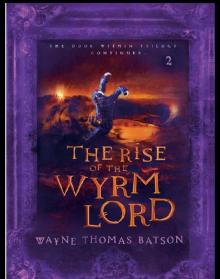 The Rise of the Wrym Lord
The Rise of the Wrym Lord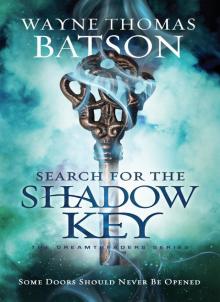 Search for the Shadow Key
Search for the Shadow Key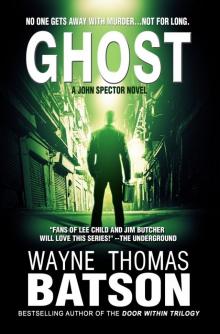 GHOST_4_Kindle_V2
GHOST_4_Kindle_V2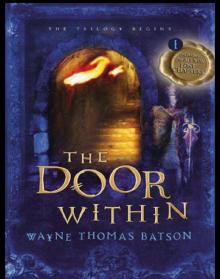 The Door Within
The Door Within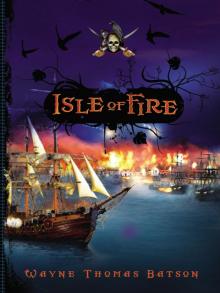 Isle of Fire
Isle of Fire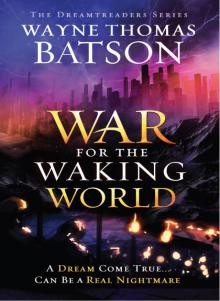 The War for the Waking World
The War for the Waking World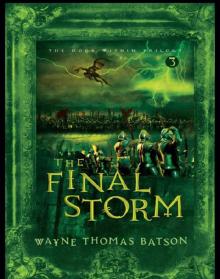 The Final Storm
The Final Storm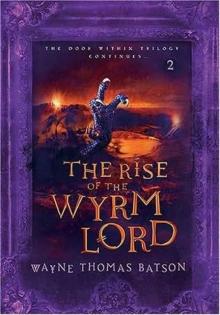 The Rise of the Wrym Lord tdw-2
The Rise of the Wrym Lord tdw-2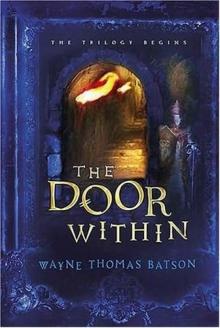 The Door Within tdw-1
The Door Within tdw-1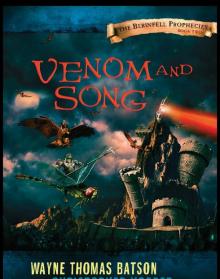 Venom and Song
Venom and Song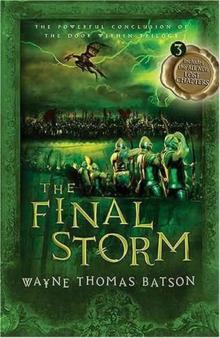 The Final Storm tdw-3
The Final Storm tdw-3